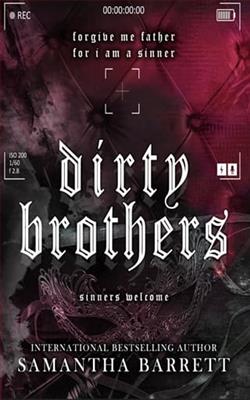Page 161 of Bad Moon Rising (Pine Deep 3)
Griswold climbed back to his feet, a flaming god wreathed in fire; he opened his mouth to cry his rage and the flames flooded inside. He thrashed and beat at the birds and the fire, but the fire burned with a greater will even than his. As Val and Crow watched, Griswold’s mighty legs buckled and he dropped to his knees. For a long time he knelt there, burning, his arms still flailing, but with each moment there was less power in his fight, less belief in his own survival. Val and Crow lay there in the mud and the blood and watched the oldest evil, perhaps the oldest sentient thing on earth, burning to death as above them the remaining night birds circled and circled endlessly.
All around Griswold, around the swamp and through the woods to where his house still stood, the trees were on fire.
Despite the thunder and lightning, the clouds overhead had parted and a swollen orange moon rode the heavens above the pyres of Halloween.
Mike’s clothes were catching fire, but he stepped closer still so that he could bring his sword high over his head and with a final grunt of effort he chopped down, cleaving between the horns and cutting all the way into Ubel Griswold’s brain. There was a burst of black light that flashed outward and struck Mike like a shock wave so that he staggered back, his eyes rolling up in his head; his sword fell from his twitching fingers as he stumbled backward and finally fell.
It seemed to take forever, but Griswold finally toppled forward onto his face and as he did so the force of will that held his shape together failed. The flesh blackened and burned away and the millions of insects that made up his body popped and hissed and steamed as they were charred to ashes. What the fire did not consume the surviving birds did.
After thirty years of planning, after centuries of hunting as man and wolf, after the meticulous ambition of the Red Wave, Ubel Griswold was dead and all his dark dreams with him.
Crow heard a sound and saw that Mike was crawling painfully toward them, and when he was near Val and Crow pulled him close and slapped out the embers on his clothes.
He curled up like a child against them, weeping uncontrollably, clinging to them with absolute need, and they in turn held him, and each other.
“Now it’s over . . . ,” Crow whispered, kissing Val’s face, her hair.
She pressed his hand to her chest over her heart.
Above them the thunder boomed again and the clouds closed once more, and then the rain fell as if Heaven itself wept.
EPILOGUE
Midnight in Hell
1
The SERT Tactical Team came in from the east in a pair of Bell Jet Rangers. They made a full circuit of the town, using nightscopes when they could and standard binoculars where there was too much fire. There were over a hundred buildings burning, cars overturned, corpses everywhere.
Lieutenant Simons, the team leader, had spent two tours in Iraq; this looked worse. Before his advance team was even on the ground he called it in as a possible terrorist attack by forces unknown. That rang bells all the way to the governor’s residence in Harrisburg, and he was on the phone to Homeland within two minutes.
The governor declared a state of emergency before the first SERT chopper set down in the high school playground, and by the time Lieutenant Simons had deployed his Tac-Teams, Homeland had issued an elevated Terror Alert.
Each Tac-Team had four men, all of them in woodland camouflage battle dress and tactical body armor; each team leader and his coverman carried the HK MP-5 9mm SMG, the point man had a Glock . 40 caliber pistol and a ballistic shield, and the fourth man backed their play with a short-barreled Remington 870 12-gauge shotgun. They were fighting fit and elite, each one of them pumped with adrenaline and ready to take down any armed resistance.
But apart from the fires and the towers of smoke, the streets of Pine Deep were as silent and still as the grave. For the first twenty minutes all they found was death.
The next wave of choppers swept in from Trenton and Philly, their blades scything through the towering columns of smoke that rose from the town, and they skirted the bigger wall of smoke that was an almost featureless gray screen across the forested hills beyond the town. The state forest raged out of control and the fingers of flame seemed eager to reach up and touch the helicopters.
The news choppers got there first, having been scrambled when the live feeds went down. They beat the first of the police units by ten minutes and so were able to tape nearly all of the rescue operation. Even the police were already on their way when Joe Bob Briggs called them from a gas station telephone in Black Marsh. He’d met up with screenwriters Susco and Gunn and the three of them had rowed a fishing boat past the smoking ruins of the bridge and called from the first phone they found.
Residents of Crestville and Black Marsh had reported the blasts to 911 and local news; planes in flight had radioed in descriptions of the widespread fires. Boats of every description pushed off from Crestville and Black Marsh, and an armada of them cruised up the Delaware, disgorging press, cops, EMTs, and lots of rubberneckers.
Police from the neighboring towns and the regular Staties were ordered to hang back well outside the perimeter of the town proper. Orders had come from the governor; the National Guard was being mobilized and Homeland would take over as soon they had a team on the ground.
The SERT teams moved out into the streets, hugging the shadows, sticking close and low to the buildings, each team cross-spotting for the other. As tough and hardened as these men were, what they saw began to wear on them very quickly.
Buildings lay in ruins. Bodies littered the streets. Then there was movement off to the left and Simons held up his closed fist and the team froze, weapons shifting to cover the pale-faced figure that moved out of the smoke. It was a woman holding a dead child in her arms. Even from across the street Lieutenant Simons could tell that the baby was dead—nothing that twisted and broken could, please God, still be alive.
The woman was white with shock, her eyes hollow, and she walked with a mindless shuffling gait.
Simons detached two men to get her and bring her over and down behind cover. She allowed herself to be nearly carried out of the street; she made no sound, registered no trace of recognition.
And that’s how it started. First her, then a pair of little girls and their dog climbed out through a cellar window of the library. A small family came out of an alley, the father holding a golf club like a weapon until the SERT team members made him put it down. The father looked at the club and then began to cry.
“We have multiple survivors,” Simons called in. “No hos-tiles visible. We need backup and med teams on the ground right now. ”
From then on choppers landed one after another in parking lots and in fields. The sounds of their rotors brought more and more people out of hiding, and they staggered out of their houses, their faces slack with shock and black with soot, their mouths trembling, eyes rimmed with red, minds too numb to even speak. Dozens of people were clearly drugged, but how and by what was not yet known. Some of the tourists and residents rushed up to the rescue teams, heedless of the guns and the warnings, and clung to the police as they wept. By the time the first team reached the hospital parking lot, some of the officers were weeping, too; the rest had faces like stone masks but with eyes that burned as hot as open furnace doors. If there had been any terrorists in Pine Deep, there would have been a second bloodbath.















